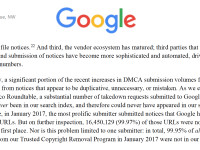The U.S. Trade Representative is conducting a hearing today on the Special 301 report, its annual list of countries it claims have inadequate intellectual property protections. Several countries will appear alongside many lobby groups. I’ve previously posted on how the report from the IIPA, which represents the movie, music, software and publishing industries, badly misstates Canadian law. Indeed, with recent court decisions, Canada now has one of the toughest anti-piracy rules in the world.
I recently obtained documents under the Access to Information Act that confirm the Canadian government’s rejection of the Special 301 process. Canada will not bother appearing today largely because it rejects the entire process. According to a memorandum drafted for Canadian Heritage Minister Melanie Joly after last years’ report:












